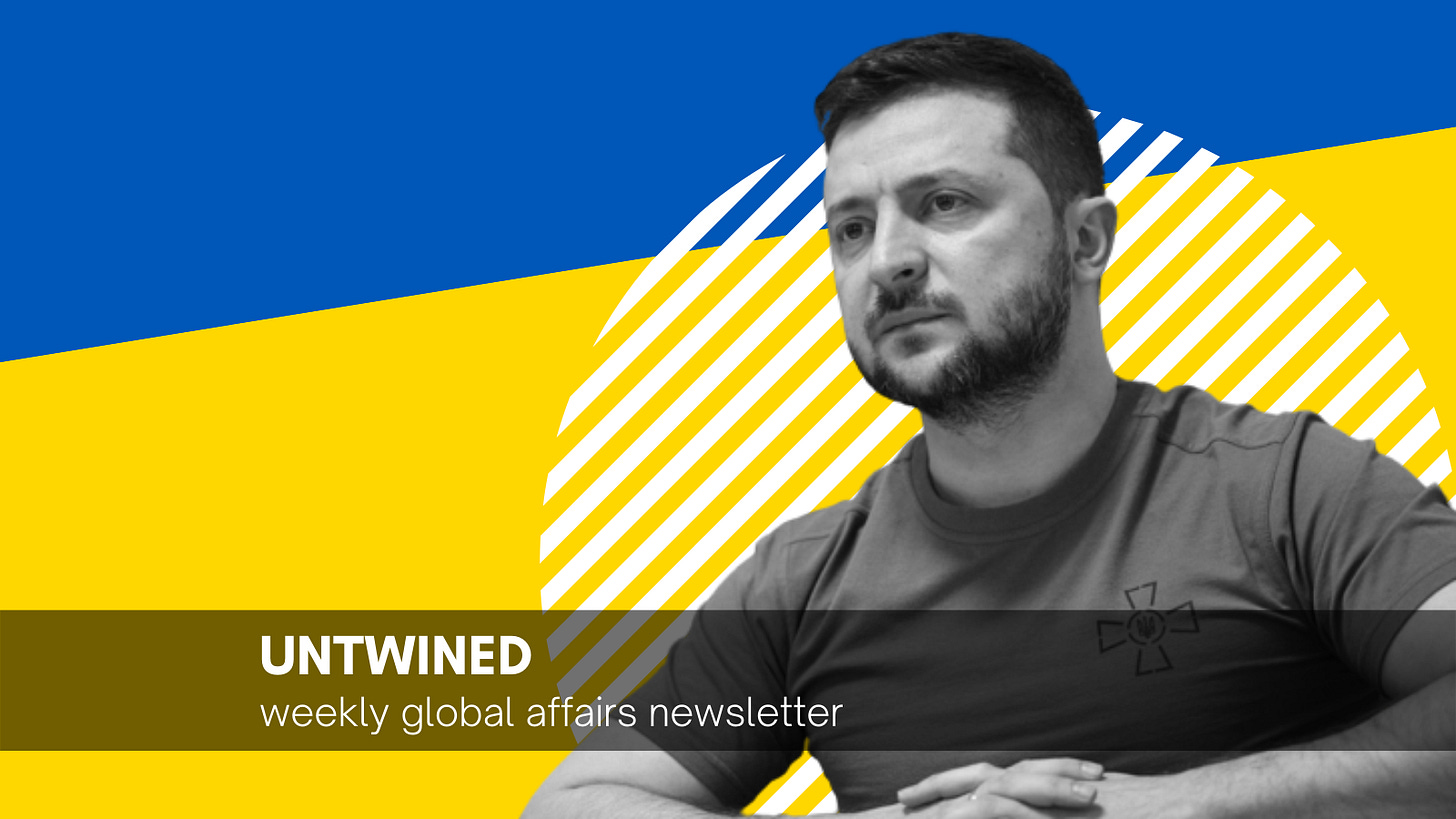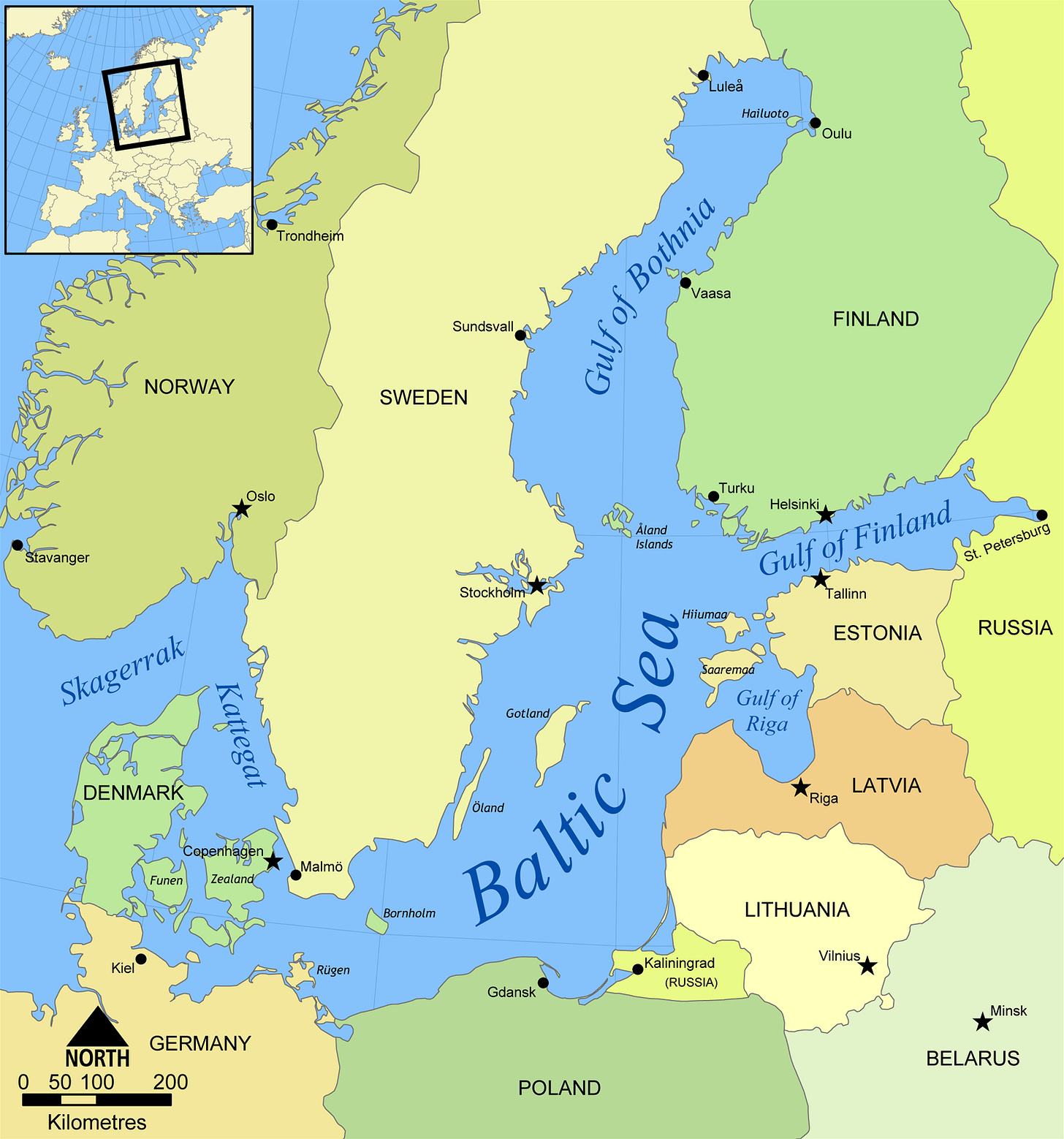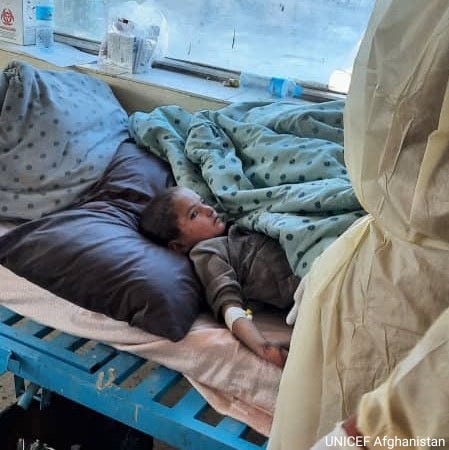Hello! I hope you have a fantastic weekend ahead. This week we’re exploring the latest developments from the Russian invasion of Ukraine. But we’re also looking at why Israel is heading into its fifth general election in three years, why the recent parliamentary election was a ‘disaster for [the newly re-elected French President Emmanuel] Macron’, Colombia’s first left-wing president, the major earthquake in Afghanistan where the death toll has gone past a thousand, and Rwanda hosting the Commonwealth nations’ heads of government summit. Let’s get started.

This day that year
1995: South Africa, the host, defeated New Zealand in the historic Rugby World Cup final — the first major sporting event to take place in the country following the end of apartheid.
1812: French Emperor Napoleon Bonaparte-led Grande Armée began an invasion of the Russian Empire to force the latter back into the continental blockade of the United Kingdom. The invasion failed.
Updates: Russia-Ukraine war
It’s been exactly four months since Russia began its invasion of Ukraine. And as the United Kingdom Prime Minister Boris Johnson warned this week, a “Ukraine fatigue” may be setting in around the world about the Russia-Ukraine crisis. So, this seems like a good time to push through a quick update on what’s happening on that front.
Earlier this week, Russia warned neighbouring Lithuania — a member of the North Atlantic Treaty Organization (NATO) — of “serious” consequences after the Baltic state stopped Moscow from transferring certain goods to the Russian exclave of Kaliningrad using railway routes that run through Lithuania. Lithuania suggests that the ban was implemented as it is following sanctions imposed by the European Union (EU) on Russia for its invasion of Ukraine. A long-standing agreement between Lithuania, EU and Russia allows Russian citizens and goods to pass through the Baltic state into Kaliningrad with ease.
A report by the BBC quoted the province’s governor Anton Alikhanov as saying that the ban would cover about half of all goods imported into Kaliningrad. The news report also quoted a senior Russian security official and one of Russian President Vladimir Putin’s closest aides Nikolai Patrushev as warning that the Kremlin “will certainly respond to such hostile actions”. Russia is demanding that Lithuania revoke the ban immediately.
The ban will affect the movement of metals, coal, construction materials and advanced technology to and from Kaliningrad.

The exclave of Kaliningrad Oblast sits by the Baltic Sea and shares no border with the rest of Russia. But the territory with a population of just under a million people — which houses the headquarters of Russia’s Baltic naval fleet — remains strategically vital to the Russians. The exclave is sandwiched between NATO members Lithuania and Poland. It’s not difficult to see why Russia considers this as a partial blockade of Russian territory.
But Lithuanian Prime Minister Ingrida Šimonytė has insisted that it’s not a blockade and that sanctions are affecting the transit of only a limited amount of goods. Šimonytė further said that as a goodwill gesture, Lithuania hadn’t suspended the agreement that allows Russian citizens to transit to and from Kaliningrad even as Russia was unable to pay for it due to sanctions on its banks.
While this Russia-Lithuania spat is unlikely to lead to a conflict, sabre-rattling in the Baltics is always risky. Lithuania is a NATO member and is therefore covered by the military alliance’s Article 5 which considers an attack on any single member state as an attack on all its members. Such an attack on a NATO member state is most likely to trigger a proportionate armed response. This article of collective defence remains “ironclad”, as United States President Joe Biden reiterated earlier this year.
Ground situation
Fighting between the Ukrainian and Russian militaries is now mainly happening in the eastern regions of Ukraine. Russia has managed to gain control of large swathes of land in Ukraine, beyond what it held — through Moscow-backed separatists — until February 24 when the invasion started.
There has been intense fighting in the key cities of Severodonetsk and Lysychansk — both in the Luhansk region — over recent days, with Russian forces trying to encircle them (in fact, The New York Times reported on June 24 that Ukraine was withdrawing from Severodonetsk and even in Lysychansk, Ukrainian soldiers may pull back to avoid encirclement).
Ukrainian President Volodymyr Zelenskyy has also accused Russia of attempting to “destroy” the Donbas region. “There were massive air and artillery strikes in Donbas. The occupier’s goal here is unchanged, they want to destroy the entire Donbas step-by-step,” Zelenskyy said.
The pace of the conflict has slowed. Russia could keep fighting at this pace for a long time, but Ukraine remains at the mercy of the West for arms supply and the global humanitarian assistance efforts.

Ukraine moves towards EU membership
In a historic decision, leaders of the EU granted Ukraine candidate status this week. This allows Ukraine to formally begin the process towards getting EU membership. But this is also exactly what the Russian President didn’t want. Moscow doesn’t want Ukraine to leave its sphere of influence and get closer to the EU. To that effect, Ukrainian Foreign Minister Dmytro Kuleba said that the candidate status would “draw a line under decades of ambiguity and set it in stone: Ukraine is Europe, not part of the ‘Russian world’”.
Usually, it takes many years for countries to get the candidate status after formally starting the process. But the Ukrainian application has been fast-tracked (it’s been just about four months since Zelenskyy launched the country’s bid to join the EU) to show European solidarity with Kyiv.
Moldova was also given EU’s candidate status. That’s also significant because the Russian-backed separatist region of Transnistria is internationally recognised as a part of Moldova.
Both countries will still take many years to actually join the EU. Ukraine will have to carry out major judicial reforms and meet EU’s standards in terms of trade and economy. That’ll only happen when the war ends.
Putin and BRICS
Meanwhile, leaders of BRICS countries discussed the situation in Ukraine during their virtual summit hosted by Chinese President Xi Jinping on June 23, and said they “support talks between Russia and Ukraine”. Russia is a part of the BRICS and Russian President Putin being seen alongside China’s Xi and Indian Prime Minister Narendra Modi would be considered a major win — in terms of optics — for Moscow. Since the invasion of Ukraine started, the West has actively tried to turn Putin into an international pariah. The BRICS — and thus, the Global South — obviously haven’t contributed to the West’s sanctions efforts (and that’s a good thing for Russia).
What else?
Over 1,000 killed in Afghanistan earthquake; Taliban seeks help
At least 1,000 people died and more than 1,500 others were injured after a major earthquake struck Afghanistan on June 22. The epicentre was close to the country’s border with Pakistan, about 44 kilometres south-west of Khost city. The death toll is expected to rise as information comes in slowly from mountain villages. The European-Mediterranean Seismological Centre said the earthquake measured 6.1 on the seismic scale, but the United States Geological Survey placed the number at 5.9. It happened at a shallow depth of just 10 kilometres. Nevertheless, it’s being called the deadliest earthquake in Afghanistan since 2002.




Handling the aftermath of the disaster will be a major humanitarian challenge for the new Taliban regime, which completed its takeover of the country less than a year ago, especially because their sanctioned administration is not receiving international aid. The United Nations’ office for the Coordination of Humanitarian Affairs (UNOCHA) confirmed that Afghanistan had requested help and that rescue personnel were being sent in. Reuters reported, citing an Afghan foreign ministry spokesperson, that the Taliban would welcome international assistance, and that Pakistan was extending help.
Colombia swings left
We had earlier discussed how countries in Latin and South America were gradually moving towards the political left. A big example of this, so far, was Gabriel Boric being elected Chile’s president in late-2021. Developments of this week have reaffirmed the trend with voters in Colombia electing Gustavo Petro as their country’s first left-wing president. Petro is an economist who served as a senator and briefly as the mayor of capital Bogota in the past, but he’s known for formerly being a member of the 19th of April Movement — a disbanded guerrilla group. He was jailed for illegal arms possession, before joining the country’s political opposition. Petro’s running mate Francia Marquez will become Colombia’s first black vice-president.
The 62-year-old’s election campaign revolved around the promise of fighting inequality and corruption. His plan is to carry out pension reforms, impose high taxes on unproductive land and provide free university education, and has proposed banning new oil projects. Petro has promised to fully implement the historic 2016 peace deal that ended the Colombian government’s long conflict with the communist guerrillas, FARC (Revolutionary Armed Forces of Colombia), and hold talks with National Liberation Army rebels that remain active.
‘Disaster for Macron’
The alliance involving French President Emmanuel Macron’s party faced a drubbing at the ballots this week in the country’s crucial parliamentary elections. This came just about two months after centrist Macron secured a re-election as the president. The ruling alliance remains the largest force in France’s legislature, but it has now lost its majority. The fractured mandate is likely to create policy paralysis and has been described as a “disaster for Macron” by The Economist’s Paris Bureau Chief, Sophie Pedder.
The biggest beneficiaries were far-left leader Jean-Luc Mélenchon’s new leftist coalition, as well as far-right leader Marine Le Pen’s National Rally alliance. Macron’s alliance will not have to form a coalition with either the centre-right The Republicans, or try to work with various parties on a bill-by-bill basis. Either way, there will have to be a lot of long-term compromises and balancing. If there’s a deadlock, Macron will have to call a snap election.
Rwanda hosts Commonwealth meet
Leaders of the Commonwealth nations are meeting in Kigali, Rwanda. The meeting is happening after a four-year gap, after being postponed because of the pandemic. Queen Elizabeth II, who serves as the head of the Commonwealth of Nations, will be represented by her heir apparent Prince Charles and Camilla, the Duchess of Cornwall. Its members (but not all) are former territories of the British Empire (host Rwanda actually doesn’t have a British colonial past or constitutional link with the UK).





The United Kingdom is pushing for cooperation among Commonwealth states, especially on the economic front. But the Commonwealth’s future itself is at stake. Barbados becoming a republic last year has opened the doors for other nations such as Australia and Jamaica that still have the queen as their monarch to follow suit — further loosening the links the Commonwealth nations share. There is a growing feeling among member nations that the Commonwealth is not a relevant concept anymore and when Prince Charles eventually becomes the monarch, some members may want to opt out or not give the group enough importance. This may already be happening: while it’s called the Commonwealth Heads of Government Meeting (CHOGM) some of group’s most important members, including Australia, India, Bangladesh, Malaysia, New Zealand, Pakistan, South Africa and Sri Lanka, will be represented by their foreign ministers or other representatives — not the head of the government (president/prime minister). Some Caribbean ministers even told Reuters at the summit that they had no personal problem with Prince Charles leading the Commonwealth, but they are uncomfortable with what may look like royal succession. The UK, and especially the Buckingham Palace, would be trying to ensure that the Commonwealth remains relevant and that Prince Charles takes over the group’s leadership at some point in the future.
The Kigali meeting will also have to steer past the criticism Rwanda faces for a poor human rights track record and the controversial refugee asylum flights plan — which we talked about last week — being pushed by the UK government.
Israel’s fifth general election in three years
Israel’s coalition government has said it intends to dissolve the parliament (called the Knesset). This will drag the country into its fifth general election in three years. The coalition led by Prime Minister Naftali Bennett, with the support of Foreign Minister and “Alternate Prime Minister” Yair Lapid, and Deputy Prime Minister and Defence Minister Benny Gantz, comprises eight political parties with contrasting ideologies. The parties of the ruling alliance had come together to keep former long-time prime minister Benjamin Netanyahu out of power. A bill to dissolve parliament will be submitted in the coming week. As per an agreement between the coalition parties, alternative PM Lapid will take over as the country’s caretaker PM until a new government is sworn-in after the elections that are likely to happen in October-November.
This explainer video by TLDR News Global why Israel's government has collapsed again
In all of Israel’s recent general elections, voters have delivered a fractured mandate with no party or pre-poll alliance securing a majority. Parties were forced to build post-poll alliances in order to form governments. But such governments proved to be very unstable. This has negatively affected Israel in a big way. For example, until November 2021, the Israel government hadn’t been able to adopt a fresh Budget for more than three years. A general election now also gives former PM Netanyahu a fresh chance to return to power.
Interesting stuff
“An optimistic United States will fortify international institutions and offer a bridge to countries in the global South — including China — that are interested in joining the order as responsible stakeholders. If, however, the great powers succumb to pessimism, then all bets are off, and the world will face a dangerous decade.” Daniel Drezner, Professor of International Politics at Tufts University, writes in Foreign Affairs about why anxious and pessimistic countries are more dangerous nations. Read the full piece here.
“If the invasion of Iraq in 2003 was the moment the West failed to live up to its own norms, such as the principles of territorial integrity and humanitarian international law, Ukraine is the moment the Global South failed to live up to its anti-colonial and anti-imperial ideals.” Bruno Maçães, Portugal's former Europe minister and author, writes in The New Statesman about why countries such as China and India that evangelise national liberation and anti-colonialism are helping Russia in its “imperial ambitions”. Read the full opinion piece here.
On March 4, we discussed how Germany had made a historic U-turn as the Russian invasion of Ukraine suddenly changed the European security architecture. Berlin announced a major hike in defence spending, is working to upgrade its military (to boost combat readiness) and has given a green light to sending arms to Ukraine. Now, this explainer video by the CaspianReport has summarised the big shift in greater detail.
Before you go… If you haven’t already, do ‘follow’ us on Twitter and Instagram.
I always look forward to your feedback. You can also send a quick email to untwinednewsletter@gmail.com.




